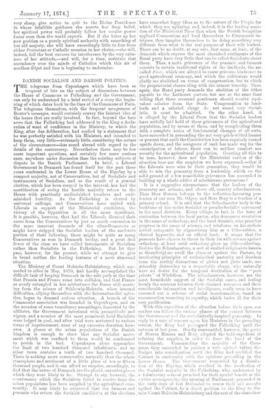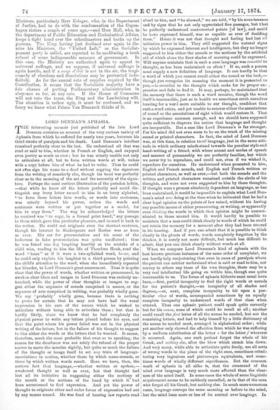DANISH SOCIALISM AND DANISH POLITICS.
TEE telegrams from Copenhagen which have been so frequent of late on the subject of dissensions between the House of Commons or Folksthing and the Government,
can only be understood by a brief recital of a story the begin- ning of which dates back to the time of the Commune of Paris.
The telegrams themselves, with the frequent meagreness of Renter's messages, would certainly convey the faintest idea of the issues that are really involved. In fact, beyond the bare news that the Folksthing had addressed to the King a decla- ration of want of confidence in the Ministry, to which the King, after due deliberation, had replied by a statement that he was perfectly satisfied with his Ministers, and intended to keep them, very little—extremely little, considering the nature of the circumstances—has oozed abroad with regard to the details of the controversy. Nevertheless there may be few more important questions, and certainly few more curious ones, anywhere under discussion than the existing subjects of dispute in the Danish Parliament. In brief, a Liberal Government in Denmark has found itself for the past three years confronted in the Lower House of the Rigsdag by a compact majority, not of Conservatives, but of Socialists and instruments of Socialism, and as the result of a general election, which has been essayed in the interval, has had the mortification of seeing the hostile majority return to the House with practically undiminished numbers and undi- minished hostility. As the Folksthing is elected by universal suffrage, and Conservatives have united with Liberals in support of the Ministerial candidates, the victory of the Opposition is all the more significant.
It is possible, however, that had the Liberals divorced their cause from the Conservatives by just so much concession to the more innocent demands of the ultra-Democrats as might have stripped the Socialist leaders of the moderate portion of their following, there might be quite as many Conservatives as ever in Denmark to-day, and a great deal fewer of the class we have called instruments of Socialism rather than Socialists in the Folksthing. But let that pass, however, for the present, while we attempt to give in broad outline the leading features of a most abnormal situation.
The Ministry of Count Holstein-Holsteinborg which suc- ceeded to office in May, 1870, had hardly accomplished the difficult task of keeping Denmark in the safe path at the time that Prussia and France came into collision, and that France so nearly entangled in her misfortunes the Danes still smart- ing from the seizure of Schleswig-Holstein, when internal difficulties, allying themselves with the Internationalist agita- tion, began to demand serious attention. A branch of the Communist association was founded in Copenhagen, and on the occasion of some tumultuary assemblages, fomented by the affiliates, the Government interfered with promptitude and vigour, and a number of the most prominent local Socialists ! were lodged in gaol, and after trial were sentenced to various ! terms of imprisonment, none of any excessive duration, how- ! ever. A glance at the urban populations of the Danish kingdom is enough to show that any Socialist move- ment which was confined to them would be condemned to perish in the bud. Copenhagen alone approaches the limit of two hundred thousand inhabitants, and no other town contains a tenth of two hundred thousand. There is nothing more conservative naturally than the whole , atmosphere and sentiment of a little place of ten or fifteen thousand people, and it can afford no surprise, accordingly, to find that the towns of Denmark are the placid, unrestive placas which they were likely to be. Strange to say, however, the countenance which the Socialists failed to receive from the urban populations has been supplied by the agricultural com- munity. It may fairly be suspected that the farmers and peasants who return the Socialist candidates at the elections
! have somewhat foggy ideas as to the nature of the Utopia for , which they are agitating, and, indeed, it is the leading asser- tion of the Ministerial Press that when the Danish bumpkins applaud Communism and lend themselves to Communist in- trigues, they imagine themselves to be doing something very different from what is the real purpose of their wily leaders. There can be no doubt, at any rate, that some, at least, of the demands which express the most cherished sentiments of the , Rural party have very little that can be called Socialistic about them. Thus, a main grievance of the peasants and farmers consists in certain traditional rights of the landlords, the so- called FIe, which are alleged to cause grievous hindrance to good agricultural economy, and which the cultivators would gladly see abolished on terms of compensation, but to which the proprietorial classes cling with the utmost tenacity. Thus, again, the Rural party demands the abolition of the tithes payable to the Lutheran pastors, but are at the same time willing that these reverend gentlemen should receive equi- valent salaries from the State. Compensation to land- lords and a salaried clergy do not sound very Social- istic, it must be admitted. On the other hand, it is alleged by the Liberal Press that the Socialist leaders have artfully laid hold of these grievances of the agricultural population, and by means of them, and by complicating them with a complete series of fundamental changes of all sorts, have succeeded in persuading the not very quick-witted farmer or peasant that until the Constitution has been regularly turned upside down, and the arrogance of rank has made way for the emancipation of labour, there can be neither comfort nor security for the agricultural population. Granting all this to be true, however, does not the Ministerial version of the situation bear out the suspicion we have expressed,—that if the Liberals were wise in their generation, they would be able to win the peasantry from a leadership which on the solid ground of a few remediable grievances has succeeded in building up a whole edifice of mischievous pretensions ?
It is a suggestive circumstance that the leaders of the peasantry are artisans, and above all, country schoolmasters. Thus Herr IIansen belongs to the reflection-favouring pro- fession of our own Mr. Odger, and Herr Berg is a teacher of a primary school. It is said that the Schoolmaster body is the backbone of the entire Socialist or pseudo-Socialist movement in the rural districts. Every village, in fact, is the bone of contention between the local pastor, who denounces revolution in the name of orthodoxy, and the local dominie, who preaches progress in the name of science, and retaliates on his ecclesi- astical antagonist by stigmatising him as a tithe-robber, a clerical hypocrite, and an official hack. It seems that the peasants have chosen to throw in their lot with science against orthodoxy, at least until orthodoxy gives up tithe-collecting. Besides the Schoolmasters, a sect of exalted religionists known as Grundtrigians swell the clamour against the Pastors, by inculcating principles of ecclesiastical austerity and freedom from the earthly distractions of glebes and glebe lands, un- utterably distressing to a respectable clergy, who naturally have no desire for the temporal destitution of the "pore priests " of Wicliffism. The schoolmasters, however, are the most formidable support of the Socialist cause, and feeling keenly the contrast between their strained resources and their considerable information and intelligence, really seem to have reasoned out a scheme of social transformation, based on remuneration according to capacity, which bodes ill for their easy pacification.
With this exposition of the situation before their eyes, our readers can follow the various phases of the contest between the Government and the socialistically-inspired peasantry. In reply to a vote of censure upon his Ministers in the preceding session, the King had prorogued the Folksthing until the autumn of last year. Hardly reassembled, however, the party of Herren Hansen and Berg adopted the bold expedient of refusing the supplies, in order to force the hand of the Government. Commanding the majority of the Com- mons, they succeeded in passing a vote against taking the Budget into consideration until the King had modified the Cabinet in conformity with the opinions prevailing in the Lower House. The Government responded by a dissolu- tion of the Rigsdag, which resulted in the re-election of the Socialist majority in the Folksthing, who, undeterred by a fulminatory sermon preached for their special benefit at the service accompanying the opening of Parliament, proceeded in the early days of last December to renew their old assaults against the Cabinet, by a direct petition to the King to dis- miss Count Holstein-Holsteinborg and the rest of the obnoxious Ministers, particularly Herr Krieger, who, in the Department of Justice, had to do with the condemnation of the Copen- hagen rioters a couple of years ago,—and Herr Hall, who, in the department of Public Education and Ecclesiastical Affairs, keeps a tight hand over the schoolmasters and backs up the parsons. The King, having just declined over again to dis- miss his Ministers, the "United Left," as the Socialist- peasant party is called, are reported to be meditating a fresh refusal of some indispensable measure of government. In this case, the Ministry are authorised again to appeal to universal suffrage, and we suppose, if universal suffrage is again hostile, and if a coup d'i.tat is not in the air, the tragi- comedy of elections and dissolutions may be protracted inde- finitely. As for the annual vote of supplies required by the Constitution, it seems that the Socialistic majority have a fair chance of putting Parliamentary administration in abeyance so far, at any rate. If the House of Commons will not vote the taxes, the King and the Landsthing will. The situation is rather ugly, it must be confessed, and we fancy we know what Prince Von Bismarck thinks of it.



































 Previous page
Previous page